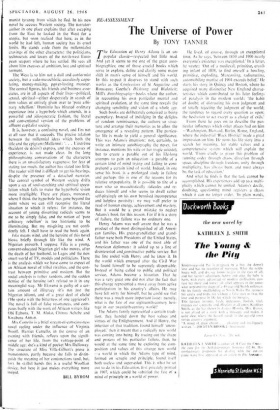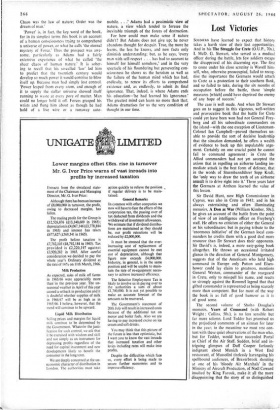The Universe of Pow er
RE-ASSESSMENT
By TONY TANNER
7"r he Education of Henry Adams is an un- popular classic—respected but little read. And yet it seems to me one of the great auto- biographies; one of those crucial books which serve to explore, define and clarify some major shift in man's sense of himself and his world.
In this respect it deserves to stand with such works as the Confessions of St Augustine and Rousseau; Goethe's Dichtung and IVahrheit; Mill's Autobiography—books where the author, in recounting his own particular mental . and spiritual evolution, at the same time reveals the changing sensibility and vision of a whole age.
Such books are deliberately conceived as being exemplary. Instead of indulging in the delights of random reminiscence, the authors so struc- ture and arrange their memories as to allow the emergence of a revealing pattern. The particu- lar life is made to yield a general significance. This was Adams's intention : not, certainly, to write an intimate autobiography (he never, for instance, mentions his wife or her tragic suicide), but to create a parable out of his life-long attempts to gain an education—a parable of a certain kind of mind trying and failing to com- prehend a certain kind of world. Indeed, in one sense his book is a prolonged study in failure and perhaps this is one of the reasons for its relative unpopularity. It is possible to tire of a man who so masochistically ridicules and re- duces himself and who seems to dwell rather self-pityingly on his own benuised incompetence and helpless passivity: we may well prefer to read of human energy, achievement and mastery. But it would be a great mistake to neglect Adams's book for this reason. For if it is a story of failure, the failure was no ordinary one.
Henry Adams was well aware that he was a product of the most distinguished of all Ameri- can families. His great-grandfather and grand- father were both Presidents of the United States, and his father was one of the most able of American diplomats: it added up to a line of disinterested and.constructive public service. But the line ended with Henry and he knew it. In the world which emerged after the Civil War he found himself to be supremely dispensable. Instead of being called to public and political service, Adams became a historian. That he was a very great one did not alter the fact that this change represented a move away from active participation in his country's affairs. He may have felt sorry for himself, but he could see that there was a much more important issue: namely, what is the fate of our eighteenth-century heri- tage in our twentieth-century world?
The Adams family represented a certain tradi- tion; they handed down the best values and virtues of the Enlightenment. And if Henry, the inheritor of that tradition, found himself 'unem- ployed,' then it meant that a radically new world was coming into being. By tracing out the shape and process of his particular failure, then, he would at the same time be exploring the com- position and values of this strange new world —a world in which the Adams type of mind, formed on scruple and principle, found itself both useless and superseded. This is what he set out to do in his Education. first privately printed in 1907, which could be subtitled the fate of a mind of principle in a world of power.
He lived, of course, through an exceptional time. As he says, 'between 1850 and 1900 nearly everyone's existence was exceptional.' In a letter, he wrote: 'Out of a medieval, primitive, crawl- ing infant of 1838, to find oneself a howling, primitive, exploding, Marconiing, radiumating, automobiling maniac of 1904 exceeds belief.' He starts his story in Quincy and Boston, where he acquired many distinctive New England charac- teristics which contributed to his later feelings of paralysis in the modern world: 'the habit of doubt; of distrusting his own judgment and of totally rejecting the judgment of the world; the tendency to regard every question as open; the hesitation to act except as a choice of evils.'
From there he goes on to describe the par- ticular influences which other places had on him —Washington, Harvard, Berlin, Rome, England, where the industrial 'Black District' made a great impression on him. He turns his life story into a search for meaning, for stable values and a comprehensive system which will explain the world. 'From cradle to grave this problem of running order through chaos, direction through space, discipline through freedom, unity through multiplicity, has always been, and must always be, the task of education.'
And what he finds is that the task cannot be accomplished. His experiences add up to a multi- plicity which cannot be unified. Adams's docile, doubting, questioning mind registers a chaos which it can no longer order. in plain words,
Chaos was the law of nature; Order was the dream of man.'
'Power' is, in fact, the key word of the book, for in its simplest terms this book is an account of a human consciousness trying to comprehend a universe of power, or what he calls 'the eternal mystery of Force.' Thus the prospect was awe- some, particularly as Adams had a fairly extensive experience of what he called 'the sheer chaos of human nature.' It is sober- ing to recall that his so-called law' led him to predict that the twentieth century would develop so much power it would contrive to blow itself up. Because man had simply lost control. 'Power leaped from every atom, and enough of it to supply the stellar universe showed itself running to waste at every pore of matter. Man could no longer hold it off. Forces grasped his wrists and flung him about as though he had hold of a live wire or a runaway auto-
mobile. . . .' Adams had a pessimistic view of nature, a view which tended to foresee the inevitable triumph of the forces of destruction.
For how could man make sense if nature didn't? But Adams does not give up; he never abandons thought for despair. True, the more he learns, the less he knows, and new facts only diminish understanding; but, as he says, 'every man with self-respect . . . has had to account to himself for himself somehow,' and in the very spectacle of his floundering but persevering con- sciousness he shows us the heroism as well as the failure of the human mind which has had, endlessly, to renew its efforts to comprehend existence and, as endlessly, to admit its final ignorance. That, indeed, is where Adams ends his education—le had learned his ignorance.' The greatest mind can learn no more than that; Adams dramatises for us the very condition of thought in our time.































 Previous page
Previous page